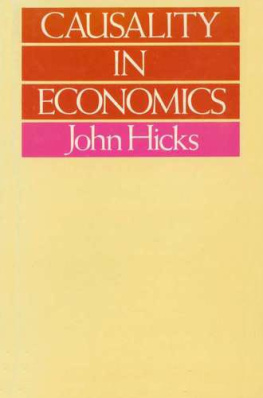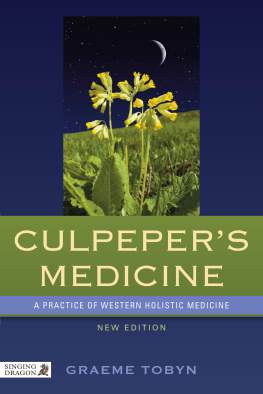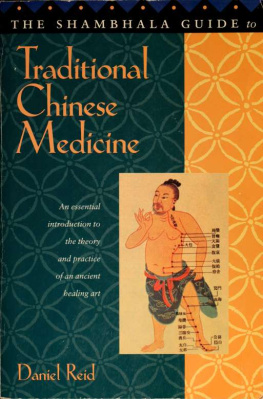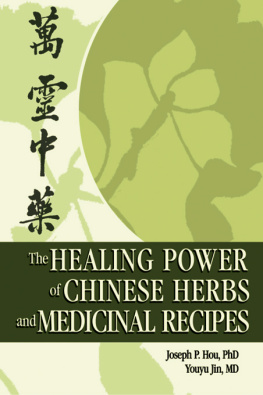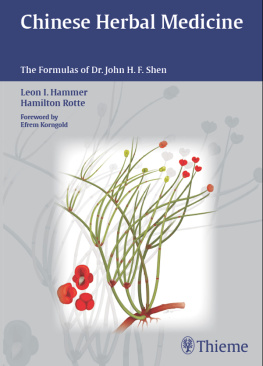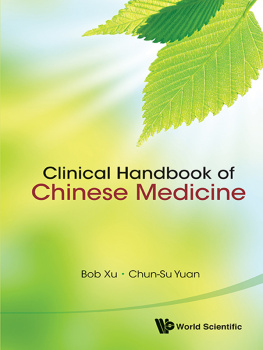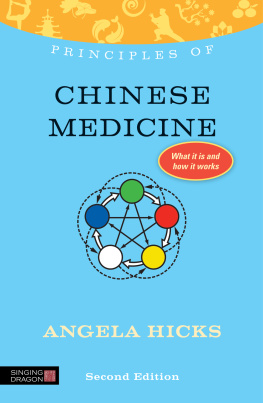
PRINCIPLES OF CHINESE HERBAL MEDICINE
other titles in the series
PRINCIPLES OF
THE ALEXANDER TECHNIQUE
Jeremy Chance
PRINCIPLES OF
BACH FLOWER REMEDIES
Stefan Ball
PRINCIPLES OF
CHINESE MEDICINE
Angela Hicks
PRINCIPLES OF
THE ENNEAGRAM
Karen A. Webb
PRINCIPLES OF
HYPNOTHERAPY
Vera Peiffer
PRINCIPLES OF
KINESIOLOGY
Maggie La Tourelle with Anthea Courtenay
PRINCIPLES OF
NLP
Joseph OConnor and Ian McDermott
PRINCIPLES OF
REFLEXOLOGY
Nicola Hall
PRINCIPLES OF
REIKI
Kajsa Krishni Borng
PRINCIPLES OF
TIBETAN MEDICINE
Dr. Tamdin Sither Bradley
PRINCIPLES OF
CHINESE HERBAL MEDICINE
What it is, how it works, and what it can do for you
Revised Edition
John Hicks

LONDON AND PHILADELPHIA
This edition published in 2013
by Singing Dragon
an imprint of Jessica Kingsley Publishers
116 Pentonville Road
London N1 9JB, UK
and
400 Market Street, Suite 400
Philadelphia, PA 19106, USA
www.singingdragon.com
First published in 1997 by Thorsons, an imprint of HarperCollins
Copyright John Hicks 1997, 2013
All rights reserved. No part of this publication may be reproduced in any material form (including photocopying or storing it in any medium by electronic means and whether or not transiently or incidentally to some other use of this publication) without the written permission of the copyright owner except in accordance with the provisions of the Copyright, Designs and Patents Act 1988 or under the terms of a licence issued by the Copyright Licensing Agency Ltd, Saffron House, 610 Kirby Street, London EC1N 8TS. Applications for the copyright owners written permission to reproduce any part of this publication should be addressed to the publisher.
Warning: The doing of an unauthorised act in relation to a copyright work may result in both a civil claim for damages and criminal prosecution.
Library of Congress Cataloging in Publication Data
Hicks, John (Herbalist)
[Thorsons principles of Chinese herbal medicine]
Principles of Chinese herbal medicine / John Hicks.
pages cm
Revision of the authors: Thorsons principles of Chinese herbal medicine, 1997.
Includes index.
ISBN 978-1-84819-133-4 (alk. paper)
1. Herbs--Therapeutic use. 2. Medicine, Chinese. I. Title.
RM666.H33H53 2013
615.321--dc23
2012040245
British Library Cataloguing in Publication Data
A CIP catalogue record for this book is available from the British Library
ISBN 978 1 84819 133 4
eISBN 978 0 85701 113 8
Introduction
The Growing Interest in Chinese Herbal Medicine
Chinese herbs are parts of a complete medical system that has diagnosed, treated and prevented illness for over 23 centuries. This health care system deals with both physical and mental problems and also strengthens recuperative powers, boosts immunity and the capacity for pleasure, work and activity. It has been working in China for over 2000 years. Today, however, similar treatments are being carried out not just in China, but in such diverse places as the suburbs of Amsterdam, a small village in rural England or a city in the mid-western United States. Chinese herbal medicine has been spreading and growing in popularity.
This popularity has been reflected in increased press and television coverage and the attention of Western doctors. In London, England, for example, the successful use of herbs, especially for skin conditions, has inspired various hospital doctors to examine specific combinations of herbs with the hope of finding the effective active ingredients. In the US there have been numerous studies of the Chinese herbs used for malignant tumours. Indeed, many Western drugs originated in just this way, from the analysis of a successfully used herb. In a more negative vein, you may also have heard of police raids on herbal suppliers where any prescriptions suspected of containing parts of endangered species have been confiscated. And you may have noticed, especially in England, an increasing number of herbal clinics manned by Chinese and run by the government of China.
Are Chinese herbs for you?
This book is for those of you considering Chinese herbal treatment. You may be wondering whether Chinese herbs are right for you. You will have heard that they help a variety of conditions, but will they help you? And what is involved? What are the herbs like? How do you take them? Are they safe? How do they compare with taking drugs? Can you take herbs and take your current medication at the same time? Do you have to have a medical disease before you take herbs?
These are natural questions and this book will give you answers from the point of view of a Chinese herbalist. I will explain what a visit to a herbalist is like. You will hear about several people who used herbs for a variety of different conditions. You will learn something about the underlying theory, how the herbs are taken and, near the end, we will discuss how you can find and choose a practitioner.
My own experience is as a practitioner of Chinese medicine since 1975. Originally I trained as an acupuncturist, but later learned herbal medicine and now use both together. In Chinese medicine, acupuncture and herbal practice share the same underlying theory and diagnosis, but the means of treatment is different. With some patients I use a combination of herbs and acupuncture and with others I use either acupuncture or herbs on their own. My job in this book is to explain how Chinese herbs can help you.
Acupuncture or herbs?
People often ask whether herbs or acupuncture would be best for them. There is no simple answer to this question. Most practitioners of Chinese medicine herbalists and acupuncturists have a view as to the advantages of one over the other and for what complaint. I do not share the beliefs that say one type of treatment is better. I have seen herbs do what acupuncture has failed to do and vice versa. It is probably fair to say that at the moment Chinese herbs have been demonstrated to be more successful with skin diseases and would be preferable in cases of severe inflammation. It is probably also fair to say that anyone whose mind or spirit is disturbed will probably respond more quickly to acupuncture. And I can already hear my colleagues disagreeing.
The difference between the two types of treatment often relates less to the relative effectiveness and more to the other differences.
For example, the nature of the health problem may dictate daily treatment. In that case it would be easier to take herbs, as visiting the practitioner on a daily basis for acupuncture would be difficult and expensive.
Some people love the sensations that occur during an acupuncture treatment; others are needle-phobic. Some people love the taste of their herbal prescription, even love brewing it up; others find the preparation and taste a burden.
Sometimes acupuncture involves more time with the practitioner and a changed state at the time of treatment. Herbs also can be experienced as affecting a person instantly, but less frequently.
The cost of acupuncture treatment is usually the same per treatment. The cost of herbal treatment depends on how often you see the practitioner and the specific herbs and the quantities. So one form of treatment may end up as more economic.
Next page

